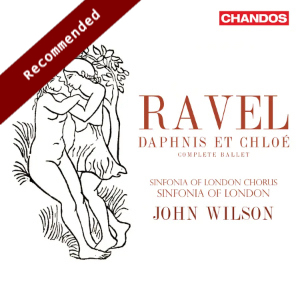
Maurice Ravel (1875-37)
Daphnis et Chloé M57 (complete ballet)
Sinfonia of London Chorus, Sinfonia of London/John Wilson
rec. 2022, Church of St Augustine, Kilburn, London
Reviewed as a digital download from a press preview
Chandos CHSA5327 SACD [54]
I always fancy myself as worthy to hold my head up with the biggest of Ravel enthusiasts. And yet I have never been able to muster more than lukewarm feelings for the complete ballet score of Daphnis et Chloé. Give me the suites any day over the full thing. Perhaps it is the case that very few ballet scores stand up on their own in their entirety away from the stage. There is, though, the lingering sense that that its scenario was the wrong sort of thing for Ravel. Debussy, in L’après-midi had shown that he had sufficient sensuality in his musical makeup for this kind of raunchy scenario but Ravel? The result to my ears is an uneven score in which it is very clear which bits caught the composer’s imagination and which he struggled with. No one wants a laboured sex scene and yet that is what we get.
Perhaps then the Hollywood panache of John Wilson and his handpicked brigade might convince me otherwise. It is unfair to always hear the rapidly widening repertoire of Wilson and Co through the filter of film music but the debt Hollywood owed to Ravel’s exceptional creativity is just too obviously audible on this recording. Typically of Wilson, that link emerges fresh and vibrant, free of any sense of stale cliché. Ravel’s use of a wordless chorus gave birth to a hundred Tinseltown epics but here is epically strange and haunting. The way Wilson integrates it into the overall sound picture is masterly.
I know next to nothing about the art of ballet but Wilson’s version sounds very danceable. Or at least, we are always aware of the underlying dance pulse even in the most languid passages. The character dances have a tang to them but I loved the way that even in the spikier moments the sound is always plush. Chandos sound and the Sinfonia of London were always going to seduce the ear but they really outdo themselves here.
Isn’t there a contradiction here between me starting this review bemoaning Ravel’s inability to do sexy and admiring the sensuality of this recording? Not really. Wilson doesn’t bother trying to make Ravel sexy preferring to make the music gorgeous. He is also very good at the ecstatic, transported mood that informs the best passages of the score. But mostly he seems content to abandon any effort to convince us that this is some kind of Impressionist Tristan. What we get is an attempt to render this work as beautifully as possible and my word is it beautiful!
Returning to my comments earlier about the complete score over the suites, there is always a danger of being suffocated by a surfeit of silk cushions. Wilson addresses this partly by making the set pieces as spectacular as possible- the Dawn sequence deserves some kind of award on its own – partly it is a keen eye for the relative rare moments of genuine drama but mostly it is a scrupulous and passionate ear for the detail, particularly the scoring, that enables Wilson to avoid musical indigestion. Wilson has prepared a new version of the score for this recording, correcting hundreds of little errors that have crept into the published score, and that level of familiarity with the nuts and bolts of the work really counts. Nothing is approximate or sketchy. Every one of the many, many textures is carefully and precisely rendered and the effect is startling.
The ultimate test is did it convince me that the complete ballet works? For me, at least, fussy pedant that I can be, the answer was a grateful and enthusiastic yes. One could carp that it isn’t particularly French in accent or that it lacks raunch but who cares when it sounds this good? (When I say it isn’t French accented I don’t mean it sounds like English schoolboy French by the way! I’m sure Wilson won’t thank me for saying that the accent of the recording sounds to me like Golden Age Hollywood in its most exotic, lustrous form).
If one is looking for an authentic French accent in this music then Monteux remains the one to go for. I’ve never much cared for Dutoit’s celebrated version but this new version carries all before it – better played, better recorded and better realised. Far from outstaying its welcome, this recording is one to be listened to again and again.
David McDade
Previous review: Paul Corfield Godfrey (December 2023)
Help us financially by purchasing from




















